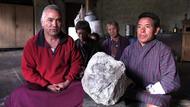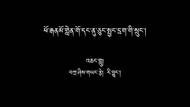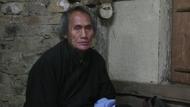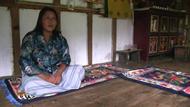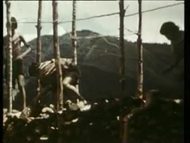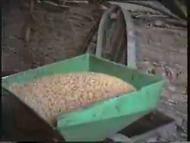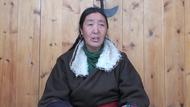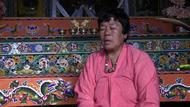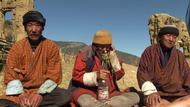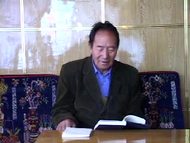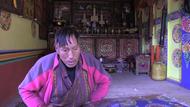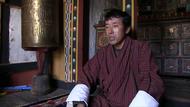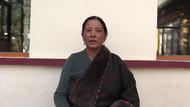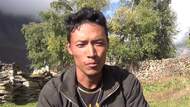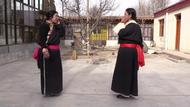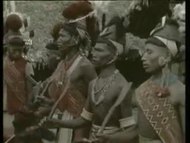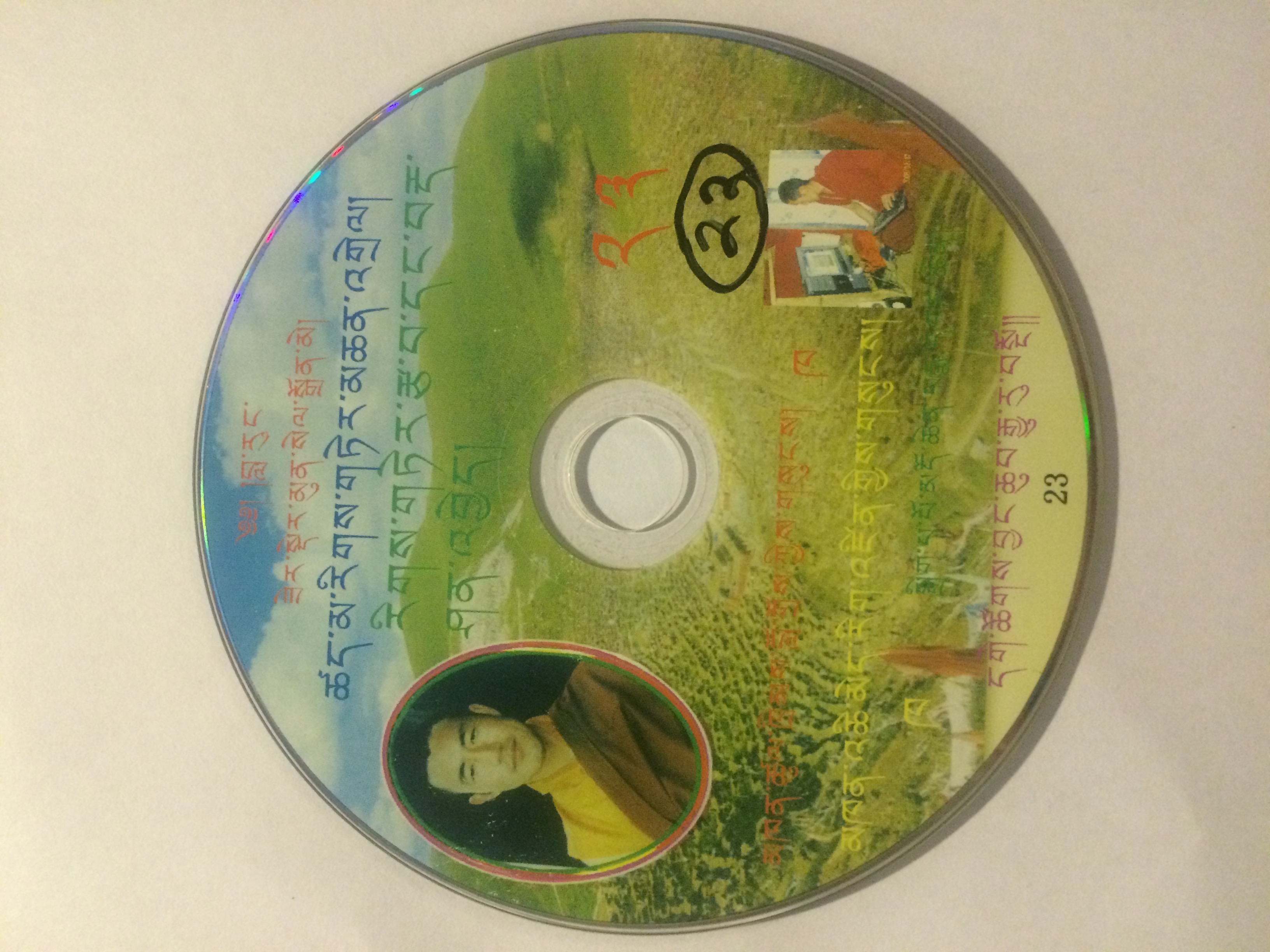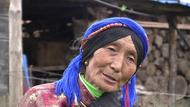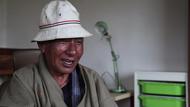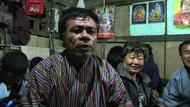Video Overview
Phuntsho Wangdi sings “A God in Human Form” (Milü Lalhe), a boedra song that describes the many difficult endeavors involved in the practice of Dharma. He proves that he had covered all the Dharma centers in Tibet under the guidance of sacred teachers like Milarepa, the great meditator, and the Buddha. The song seems to be dedicated to famous Tibetan girls Nangsa Obum and Pelmo to get blessings from the Buddha. Nangsa Obum was an emanation of Dorje Phagmo, Vajrayogini, who overcame hardships and attained liberation at the end, whereas,
- Ngatsang
- ཕུན་ཚོགས་དབང་འདུས།/Phuntsho Wangdiམི་ཡི་ལུས་ལ་ ལྷ་ཡི་མཚར་དུ་བྱེད་ལ་ གཟུགས་མཛེས་སྣང་ས་འོད་བུམ་བདག་ལ་གསན། །A god in human form, listen a beautiful Nangsa Yoebum (name of an opera)
- ཕུན་ཚོགས་དབང་འདུས།/Phuntsho Wangdiསྤྲང་པོ་བདག་གི་མ་མཆིས་ ༼ཡུལ་ནས་སྨད་ལ་༽དབུས་གཙང་བདག་སྐོང་སྟོན་མི་ཀུན་ལ་མཆིས། །I, the poor had not been to downhills, went to all parts of Yoetsang
- ཕུན་ཚོགས་དབང་འདུས།/Phuntsho Wangdi༼འདས༽་པའི་གཏམ་ཡང་བདེན་པ་ ༼ཤ་ཏ༽ལས་ལ་ རྫུན་གྱི་ཚིག་ནི་གཅིག་ཀྱང་ བཤད་མ་སྨྱོང་། །From hundreds of truth story, had never told one word lie
- ཕུན་ཚོགས་དབང་འདུས།/Phuntsho Wangdiདམ་ཆོས་དར་བ་བོད་ཀྱི་དབུས་གཙང་འདིར་ལ་ དབེན་པའི་རི་ཁྲོད་གཅིག་ལས་གཅིག་བསྐྱེད་ཅིག །In the Yoetsang of flourished dharma, meditated in the soltary hermitage one another.
- ཕུན་ཚོགས་དབང་འདུས།/Phuntsho Wangdiབླ་མ་བྱིན་རླབས་གཅིག་ལས་གཅིག་ཆེ་ཡོད་ལ་ ༼མང་དུ་བསྡུ་པའི་དམ་བསྔོ་མ་བདེ་ཀྱང་། །༽The blessings of lama is greater from one another, though unable to accumulate much more good wishes
- ཕུན་ཚོགས་དབང་འདུས།/Phuntsho Wangdiདེང་སང་ཕྲིན་ལས་འགྲོ་དོན་ཆེ་བ་རི་ལ་ ༼བདེ་སྐྱིད་བླ་ཆེན་གང་སྐྱེ་ར་བ་ན། །༽In the mountains of great spiritual activities of beings, in the yard where great lama of peace had born
- ཕུན་ཚོགས་དབང་འདུས།/Phuntsho Wangdiརྣལ་འབྱོར་དབང་ཕྱུག་མི་ལ་རས་པ་བཞུགས་ལ་ ས་ཐག་རིང་བའི་དཔལ་མོ་ ༼བླ་མའི་བྲལ། །༽Dwells a mighty saint- Milaripa, Separated from distant Pelmo by a lama.
- ཕུན་ཚོགས་དབང་འདུས།/Phuntsho Wangdiའདི་ནས་གཙོས་པའི་བྱང་ཆུབ་ ༼ཕ་གི་དང་ལ་ བྱག་ཕུན་སུམ་ཚོགས་པའི་ཐ་ཉིད་བྲལ་མཚུངས་ཡོད། །༽Including this the benevolence father and the prosperous cliff's have similar meaning of separation
- ཕུན་ཚོགས་དབང་འདུས།/Phuntsho Wangdi༼བྱག་རི་སེང་གེ་རྣམ་དུ་ ༼ཆོང་དྲག༽དང་ལ འདི་རེ་༼གླང་ཆེན་འཁྲིད་ལ༽ མཉེས་་གྲོལ་ན་ལ། །༽The Chongdrag of mountains, cliffs and lion shapes, delights to lead an elephant there...
- ཕུན་ཚོགས་དབང་འདུས།/Phuntsho Wangdi༼དགོན་པ་སྐྱིད་པོ་སེར་རག་ ཡར་ལུང་ནང་ལ་ ༽བླ་མ་བཟང་པོ་ཤཱཀྱ་རྒྱལ་མཚན་བཞུགས། །In the peaceful abbey Serrag of upper village, dwells a noble lama- Shacha Gyaltshen.
- ཕུན་ཚོགས་དབང་འདུས།/Phuntsho Wangdiའདི་ནས་དམ་ཆོས་རྫོགས་པ་ཆེན་པོ་ཡི་ལ་ མཁས་ཞིང་གྲུབ་ཐོབ་པའི་ བླ་མ་ཡི། །a accomplished scholar of Great completeness of dharma, a lama
- ཕུན་ཚོགས་དབང་འདུས།/Phuntsho Wangdiདཔོན་མོ་ཆོས་ལ་ཕེབས་ན་ འདི་རུ་ཕེབས་ལ་ སྣང་ས་བླ་མ་མཇལ་ན་ འདི་རུ་མཇལ། །If you want, come here to do dharma, If you want, meet a Nangsa lama here.
- ཕུན་ཚོགས་དབང་འདུས།/Phuntsho Wangdiསྣང་ས་བླ་མ་མཇལ་ན་ འདི་རུ་མཇལ། །Meet a Nangsa lama here, if you want to.
 Loading ...
Loading ... 




